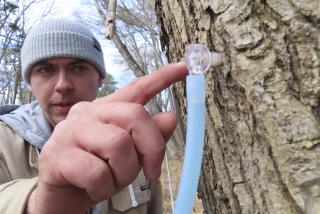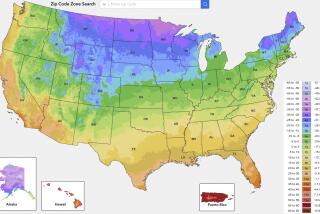Extended Chill Blocks Maple Syrup Flow : New England: Producers have their gear ready to catch the sap but the spring thaw has yet to make an appearance.
- Share via
SPRINGFIELD, Mass. — No prudent New Englander would put much stock in the sight of a few chilly robins that probably got blown off course during the last blizzard.
The only sure sign of spring up here is the rattle of buckets and the sweet smell of maple sap on the boil.
But January passed without a thaw. February has given way to March and more snow. And New England’s maple bush is silent.
“This winter has been a nightmare,” said Tom McCrumm, president of the Massachusetts Maple Producers Assn. “I stopped looking at the thermometer because it always reads 10 below and you can’t get out into the woods even on snow shoes.”
Sugarers need temperatures above freezing in the daytime to get the sap flowing in the trees and below freezing at night to keep the maples from budding.
Last year, cold and a string of late spring storms kept the maples from thawing until April 1.
Then it warmed up fast and the season, which normally lasts for a month or so, was over in little more than a weeklong gush that kept sugarers on the run from Maine to Connecticut.
“Short and sweet,” said McCrumm. “But I don’t want to go through that ever again.”
This year, the closest McCrumm has come to sugaring is loading his taps and tubing into the back of his truck.
“A woman came up to me and said she was just glad to see me out with my tanks and tubing, because that meant that spring would really come someday,” he said.
It’s the same in Connecticut.
“The sap isn’t running. I haven’t tapped a tree yet,” said Alvin Warner, owner of Shultz Farm in Hamden, Conn. Southern New England sugarers are usually collecting sap by mid-February.
In Maine, it’s still too early to even think about spring.
Gaylene Cooper of Cooper’s Maple Products in Windham said the really good runs don’t start until the middle of March, “unless we get lucky.”
Sugar makers in New Hampshire say their tubing is hung and the wood supply is in, but they need some cooperation from the weather before they can fire up evaporators to boil the sap down into syrup, said Gail McWilliams, a spokeswoman for the state agriculture department.
Meanwhile, McCrumm was looking ahead, and the future wasn’t entirely rosy.
“Someday, we will look around and wonder where all the snow went so fast. It will happen. Spring will come and before long the black flies will be back.”
More to Read
Sign up for The Wild
We’ll help you find the best places to hike, bike and run, as well as the perfect silent spots for meditation and yoga.
You may occasionally receive promotional content from the Los Angeles Times.





